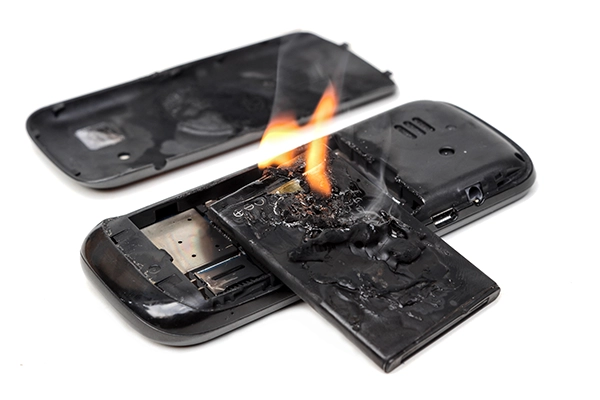21 August 2024
Lithium batteries and home insurance
3 minutes
Lithium batteries are now commonplace. You can find them in laptops, cameras, e-cigarettes, e-bikes, e-scooters and electric vehicles. They give thousands of hours of reliable service and are relatively light weight. But lithium batteries have a problem – they catch fire.
Fires caused by lithium batteries rose by 43% in 2023 compared to the previous year and batteries that power electric vehicles such e-bikes, e-scooters and e-cars - were responsible for almost three fires a day across the UK last year1.
What is a lithium battery?
Lithium batteries are any battery that uses the chemical lithium. They have a high discharge capacity so can provide a high current. There are two main types – rechargeable and disposable – both of which can catch fire.
Lithium batteries are integral to a device. I.e. a lithium battery will be in the laptop – it isn’t the power supply.
 |
Why do lithium batteries catch fire?The main reasons for lithium batteries catching fire are:
A lithium battery will catch fire when an increased current rate causes an increased chemical reaction rate in the lithium. This chemical reaction causes a thermal runaway which leads to rapid overheating. The heat in the battery will spread from cell to cell resulting in the battery spontaneously igniting and burning at an extremely high temperature. The temperatures involved and the sparks generated cause the fire which is then fuelled by vented gases as the battery cells decompose further. This results in fire which spreads rapidly. In addition to this, due to the self-sustaining process of a thermal runaway, lithium battery fires are difficult to put out and can reignite. |
What are the warning signs?
- Heat. If a lithium battery becomes very hot to the touch, there’ s a chance that it’s defective and it may start a fire.
- Swelling. Signs of swelling may include a phone case not fitting as well as it used to, a gap between components, or buttons becoming stiff or hard to push.
- Noise. A hissing, cracking or popping sound could signal a potential issue.
- Odour. A strong or strange smell from the battery may indicate a failing.
- Smoke. A smoking battery is a clear warning sign.
What should I do if there is a warning sign?
If a device with a lithium battery is displaying any of the above warning signs then you should do the following:
Immediately turn off the device and unplug it from the power source.
If you can, carefully move the device to an area away from people, flammable materials, or substances.
We would then advise that you contact the device manufacturer or retailer for further instruction. In the meantime, do not use the device in question.
My device has caught fire – what should I do?
If you suspect that the thermal process has begun and a fire is likely or has already started, then raise the alarm.
If it is safe to do so you can use a CO2 or water fire extinguisher to put out the fire but remember to cool the device as the fire will start again if the thermal runaway process continues.
Use non flammable liquids to do this and do not try to cool it with ice as it will insulate the battery and may cause the battery to explode. Equally, do not cover the device or put it in a burn bag.
How can I prevent a lithium fire?
One of our insurer partners, Pen underwriting, offers the following safety advice:
- Only buy batteries that are from a reputable manufacturer.
- Always follow the manufacturers’ instructions when charging, using, and storing batteries.
- Never cover charging devices.
- Do not expose batteries to extreme temperatures, direct sunlight, or moisture.
- Store batteries in a cool, dry place, and where possible, remove the battery when not in use.
- Batteries should always be charged on hard, flat surfaces where heat can dissipate, and if possible, using a fire-safe charging bag.
- Avoid overcharging the battery and unplugging the charger once the battery is fully charged.
- Only charge batteries when you are present and monitor the process. Avoid charging batteries overnight.
- Use only the charger that came with the battery and avoid buying counterfeit or low-quality batteries.
- Regularly inspect charging cables and adapters for any signs of wear or damage.
- Never leave items on charge where the block has emergency exits.
- Never charge non-rechargeable batteries
If you notice damage to a battery or feel excessive heat from a charging device, stop using the device and refer to the manufacturer for further advice and guidance.
Lithium batteries and home insurance
Prevention is better than cure and unfortunately the only real test of your insurance is in the event of a loss and inadequate protection can make the situation even more distressing and disruptive. When it comes to home insurance, a sentence here or there can make all the difference and by checking the small print you might find that you don’t have the level of cover you though you did.
Providing advice is at the heart of everything we do, so we always offer clear, sensible and independent advice about what our clients should insure. To speak to us about your home insurance call 020 8256 4901 or email privateclients@howdeninsurance.co.uk
Sources
1. www.britsafe.org/safety-management/2024/fires-caused-by-lithium-ion-batteries-up-46-last-year

